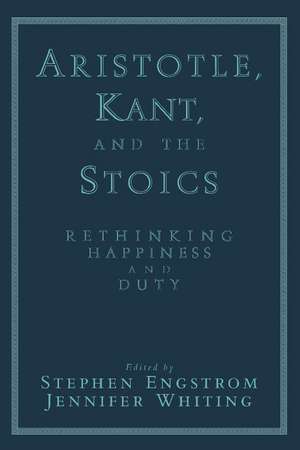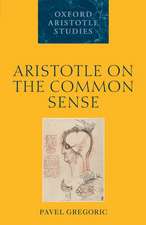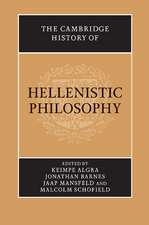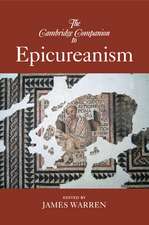Aristotle, Kant, and the Stoics: Rethinking Happiness and Duty
Editat de Stephen Engstrom, Jennifer Whitingen Limba Engleză Paperback – 12 apr 1998
Preț: 424.12 lei
Nou
Puncte Express: 636
Preț estimativ în valută:
81.17€ • 84.43$ • 67.01£
81.17€ • 84.43$ • 67.01£
Carte tipărită la comandă
Livrare economică 14-28 aprilie
Preluare comenzi: 021 569.72.76
Specificații
ISBN-13: 9780521624978
ISBN-10: 0521624975
Pagini: 324
Dimensiuni: 152 x 228 x 30 mm
Greutate: 0.41 kg
Editura: Cambridge University Press
Colecția Cambridge University Press
Locul publicării:New York, United States
ISBN-10: 0521624975
Pagini: 324
Dimensiuni: 152 x 228 x 30 mm
Greutate: 0.41 kg
Editura: Cambridge University Press
Colecția Cambridge University Press
Locul publicării:New York, United States
Cuprins
Part I. Deliberation and Moral Development: 1. Deliberation and moral development in Aristotle's ethics John McDowell; 2. Making room for character Barbara Herman; Part II. Eudaimonism: 3. Kant's criticisms of Eudaimonism T. H. Irwin; 4. Happiness and the highest good in Aristotle and Kant Stephen Engstrom; Part III. Self-Love and Self-Worth: 5. Self-love, self-benevolence, and self-conceit Allen W. Wood; 6. Self-love and authoritative virtue: Prolegomenon to a Kantian reading of Eudemian Ethics VIII 3 Jennifer Whiting; Part IV. Practical Reason and Moral Psychology: 7. From duty and for the sake of the noble: Kant and Aristotle on morally good action Christine M. Korsgaard; 8. Aristotle and Kant on morality and practical reasoning Julia Annas; Part V. Stoicism: 9. Eudaimonism, the appeal to nature, and 'Moral Duty' in Stoicism John M. Cooper; 10. Kant and Stoic ethics J. B. Schneewind.
Recenzii
'Importantly, old stereotypes, or conventional wisdom, about the differences between ancient and modern ethics, especially between Aristotle and Kant, are challenged, exposing possible unities (and historical influences) that tradition has overlooked. However, superficial similarities are also probed and sometimes shown to mask deep remaining differences. The papers call attention to, as well as represent, a quite remarkable contemporary revival of important philosophical/scholarly treatment of the history of ethics, and the authors are, without exception, major players in this movement.' Thomas E. Hill, Jr, University of North Carolina, Chapel Hill
Descriere
This major collection of essays offers the first serious challenge to the traditional view that ancient and modern ethics are fundamentally opposed.














